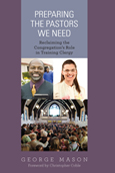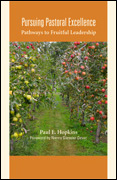 What kind of church will we hand over to our children and grandchildren? The answer will largely depend upon the kind of leaders we train for the church in our time. And chief among those leaders are the pastors who will serve and guide our churches.
What kind of church will we hand over to our children and grandchildren? The answer will largely depend upon the kind of leaders we train for the church in our time. And chief among those leaders are the pastors who will serve and guide our churches.
New developments come about to address crises that arise. One such crisis has been the experience of young ministers within their first five years in the parish after leaving seminary. Loneliness often accompanies a young minister who is either a solo pastor in a church or much younger than other staff. Feelings of inadequacy and frustration with the church can emerge from criticism of lay people that may or may not be warranted. Congregational ministry demands a level of skill that seminaries cannot adequately refine, and such areas as finances, budgets, personnel management, and vocational identity are also not well suited to seminary study. Faced with these challenges, some young ministers begin to question their call, and too many drop out of ministry altogether.
Everyone—from the church to the seminary to the minister himself—has a vested interest in helping young pastors get off to a good start. The foundation for a lifetime of ministry is laid in the first few years, for good or ill. The Church needs to this time spiritually generative and vocationally healthy.
Among the new ways churches are taking up this work is through the creation of pastoral residency programs: a congregation invites one or more young ministers to join the pastoral staff for two or three years, and then the church sends them out to their first full-time call in another congregation. Pastoral residency provides a period of transition during which seminary graduates can begin the work of ministry under the supervision of an experienced pastoral team, with the support of key lay leaders and the collegiality of peers.
The residency period allows young ministers the opportunity to hone such skills as preaching, teaching, pastoral care, and administration in a nurturing culture that will strengthen the young minister’s confidence and competence in serving the church. Residents are treated as pastors, albeit fledgling ones. The church helps them to accept the pastoral life and the habits of ministry that make it up.
These are interesting times for the church. The oft-heard cry that the church is dying, evidenced by membership and attendance declines in some quarters, fails to account for the resilient hope Christians live by. The church is Christ’s body, and Christ’s body is ever dying and rising again. We only have to widen our vision or shift our gaze to see signs of new life in the church. Protestant and Pentecostal churches to the south and east—that is, in Central and South America, in Africa, and in South Korea and China, for instance—are much chronicled for their gains in number and vitality. The entrepreneurial emerging church movement in North America taps into the hunger for relevance and authenticity many young people experience, adapting to and adopting the more casual and technologically savvy lifestyle that is reshaping daily life.
Signs of new life are appearing also among more traditional Mainline Protestant and Catholic churches that remain committed to carrying forward and passing on ancient practices, tested liturgy, and sturdy structures for communal faith. Churches like these play their own important role in the larger body of Christ. While some churches innovate by focusing on particular theological approaches, targeted demographic strategies, or contemporary worship styles to reach people otherwise uncommitted or uninvolved, established churches are designed for the ages—all ages, that is, and from age to age.
All churches know things they don’t even know they know— things that have been passed on to them and that they can pass on to the next generation—if only they will become aware enough of what they know in order to teach it. Our churches need to teach what we know to those who will teach others as we have taught them. Wisdom resides in pew and pulpit alike. Clergy and laity are important to this work of training leaders for the church from generation to generation.
Successful clergy training programs require teaching congregations that will become, at the same time, learning communities of shared reflective practices.1 Teaching congregations take a special interest in communicating the whys and wherefores, as well as the how and how-comes, to those who do the work of ministry. Pastors pastor, but at the same time they help young ministers become pastors, too. Laypersons don’t just listen to sermons and teach preschoolers and serve in the food pantry; they say what they are hearing to those who are preaching, they bring others alongside them as they teach and show them how to do it, and they help others catch a vision for mission by encouraging their service. Teaching congregations adapt. They learn from what they do and become better at it either by repetition or by changing their approach. But teaching congregations have a special interest in passing on the church to the next generation. One slice of that concern—the training of tomorrow’s clergy—is where pastoral residency comes in.
As the church sets out to do one thing—train effective clergy—it will discover a surprising byproduct: it will become more alive on both sides of the Communion rail. What’s more, it will become more effective at training lay leaders. Like a spider web, touch it at any place and it will affect every other place on the web.
Gifted and capable leaders—clergy and lay both—give churches energy and direction. Each depends upon the other in the work of building strong churches for their own time and place and for the work of the church beyond their time and in other places.
Over the last decade a few dozen churches, employing various models unique to their own church cultures, have been pioneering and experimenting with the practice of training clergy. Other models sponsored by denominations or local judicatories have used congregations in different but similar ways to foster better transitions into ministry for young clergy. Some of their stories will be told here as a way of encouraging others to undertake this work.
These programs have shaped the young ministers being trained and at the same time renewed the churches doing the training. In the process of mentoring the young ministers, senior pastors, permanent staff, and key lay leaders have found new joy in their own ministries. While this work takes place in local churches and energizes those churches in the process, its larger effect on the wider church is only now beginning to be seen, as these well-formed young pastors find their places in the congregations that call them to serve.
Adapted from Preparing the Pastors We Need: Reclaiming the Congregation’s Role in Training Clergy, copyright © 2012 by the Alban Institute. All rights reserved.
Copyright © 2013, the Alban Institute. All rights reserved. We encourage you to share Alban Weekly articles with your congregation. We gladly allow permission to reprint articles from the Alban Weekly for one-time use by congregations and their leaders when the material is offered free of charge. All we ask is that you write to us at alban@div.duke.edu and let us know how Alban Weekly is making an impact in your congregation. If you would like to use any other Alban material, or if your intended use of Alban Weekly does not fall within this scope, please submit our reprint permission request form.

Preparing the Pastors We Need: Reclaiming the Congregation’s Role in Training Clergy
George Mason
Amid the widespread discussion about “the future of the church,” an important point is sometimes overlooked: tomorrow’s church will depend to a great extent on the new pastors of today who will serve and guide our churches in the years ahead. George Mason’s Preparing the Pastors We Need: Reclaiming the Congregation’s Role in Training Clergy makes a timely intervention, asking us to redefine pastoral leadership by analyzing how, in fact, pastors are made in the first place.

Starting with Spirit: Nurturing Your Call to Pastoral Leadership
Bruce G. Epperly
Starting with Spirit is a spiritual and professional resource for new pastors, their family members, and congregations, as well as ministers in every season of ministry who seek to grow in vitality and skill in the ongoing adventure of ministry.
 Becoming the Pastor You Hope to Be: Four Practices for Improving Ministry
Becoming the Pastor You Hope to Be: Four Practices for Improving Ministry
Barbara J. Blodgett
Becoming the Pastor You Hope to Be unapologetically urges clergy readers to develop practices that will help them become more excellent ministers. A long-time field educator, now serving as a denominational staff person responsible for ministerial formation, Barbara Blodgett believes excellence is a matter of doing simple things with care and consistency. Ministers who commit themselves to excellence will grow and flourish, and even become happier in ministry.
 Pursuing Pastoral Excellence: Pathways to Fruitful Leadership
Pursuing Pastoral Excellence: Pathways to Fruitful Leadership
Paul Hopkins
In Pursuing Pastoral Excellence, pastoral counselor and educator Paul Hopkins aims to help pastoral leaders make a lasting and positive difference in the lives of the people and communities they serve.
